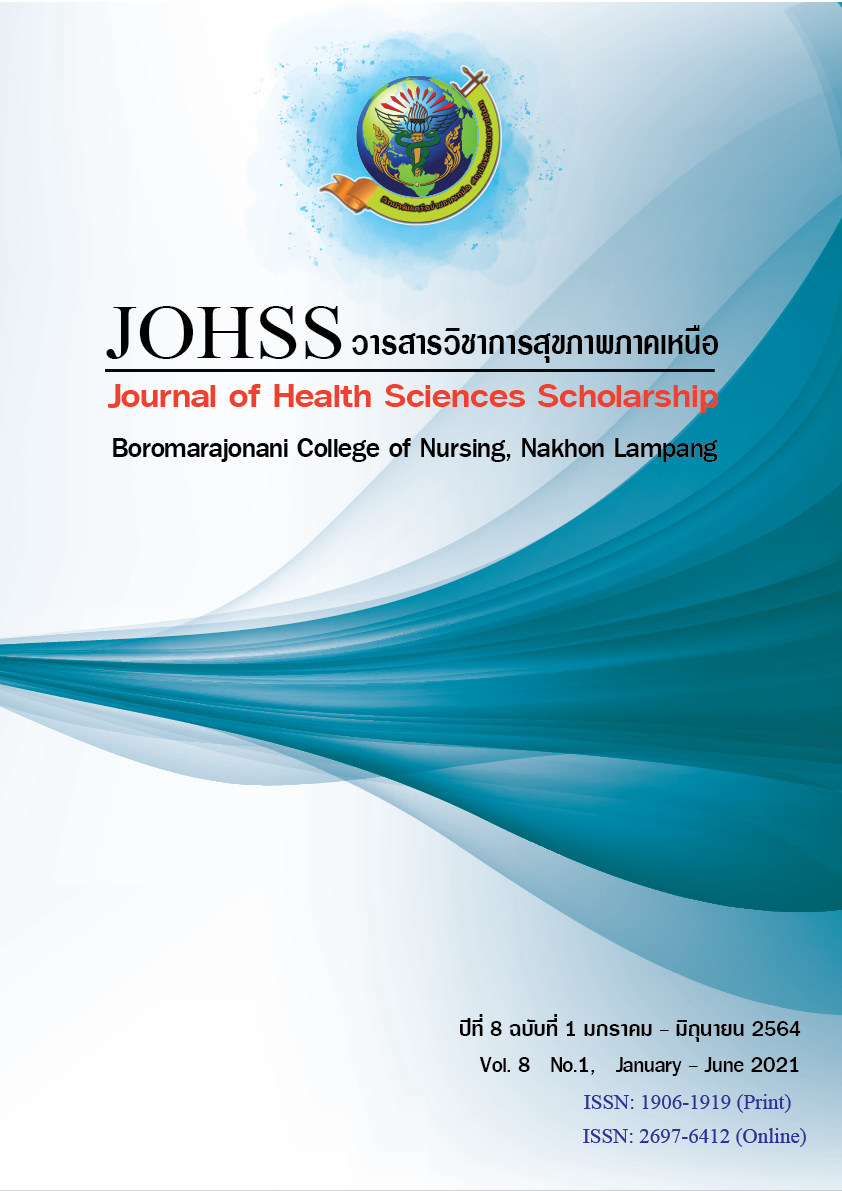The Association between Health Literacy and Food Consumption Behaviors Among Type II Diabetes Patients in Baan Khuang District Health Promotion Hospital, Hangchat District, Lampang Province
Keywords:
Health literacy, Food consumption behaviors, Type 2 diabetesAbstract
This descriptive research aimed to study the relationship between health literacy and food consumption behaviors among type 2 diabetes patients in Baan Khuang district health promotion hospital, Lampang province. The participants were comprised of 231 people with type 2 diabetes and they were chosen by simple random sampling. The instrument of this study were the health literacy and food consumption behaviors evaluation questionnaires which are developed from 6 aspects of the health literacy concept and health education section, Ministry of public health. The data was collected during may-june 2020 and were analyzed analyzed by descriptive statistics, and inferential statistics with a statistical significance at p-value <0.05.; Chi square test.
The results revealed that most of the diabetic patients have poor level of health literacy 54.11 percent, followed by fair level of health literacy 22.94. The results of health literacy was classified into 6 aspects. It was found that people with diabetes have the highest health literacy in access to health and health service 79.12, followed by cognitive skill 68.89, the lowest was Decision skill 62.23. Moreover, most of the diabetic patients have poor level of food consumption behaviors at 57.58, followed by fair level 24.67. Nevertheless, health literacy was significantly related to consumption behavior of type 2 diabetes patients at 0.01.
Recommendations Enhancing the health literacy in people with type 2 diabetes should focus on improving the health literacy of patients in all 6 aspects to improve the blood sugar control.
References
Aekplakorn, W. (Ed.). (2014). The fifth national health examination survey 2014. Nonthaburi: health system
research institute. (in Thai).
American Diabetes Association. (2015).Standards of medical care in diabetes-2015 abridged for primary care
providers. Clin diabetes. 33(2), 97-111. doi:10.2337/diaclin.33.2.97.
American Diabetes Association. (2017). Standards of medical care in diabetes-2017.Diabetes care. 40 (suppl.1),
s1-s135.
DeWalt, D. A., Berkman, N. D., Sheridan, S., Lohr, K. N., & Pignone, M. P. (2004). Literacy
and health outcomes: A systematic review of the literature. Journal of general
internal medicine, 19(12), 1228–1239.
Gazmararian et al.(1999). Effects of health literacy on health status and health service utilization amongst the
elderly, Social science & medicine. 66(8), 1809-1816.
Gazmararian JA, Baker DW, Williams MV, Parker RM, Scott TL, Green DC, et al. (1999). Health literacy among
medicare enrollees in a managed care organization. JAMA. 281 (6): 545-51.
Ginggeaw, S. and Prasertsri, N. (2015). The relationship between health literacy and health behaviors of the
elderly with multiple chronic diseases. Nursing journal of the ministry of public health. 25(3):43-54. (in Thai)
HDC.(2020). Lampang HDC. (online), Available: https://lpg.hdc.moph.go.th/hdc/reports/report.
php?ource=pformated/format1. php&cat_id=b2b59e64c4e6c92d4b1ec16a599d882b&id
=137a726340e4dfde7bbbc5d8aeee3ac3.(2020, 9 February). (in Thai).
Kim, S. H., & Youn, C. H. (2015). Efficacy of chronic disease self-management program in older Korean adults with
low and high health literacy. Asian nursing research, 9(1), 42-46.
Krejcie, R. V. & Morgan, D. W. (1970). Determining sample size for research activities.
Educational and psychological measurement. 30(3), pp. 607-610.
National Health Security Office of Thailand. (2015). An assessment on quality of care among patients diagnosed
with type 2 diabetes and hypertension visiting hospitals of ministry of public health and Bangkok
metropolitan administration in Thailand.Retrieved from :
http://www.skto.moph.go.th/ssj/disease/tb/download/NCD%2059. (in Thai).
Norasing Montree ,Thanomphan Sutthiphan.(2019). Health literacy and health behavior in patients with
uncontrolled blood sugar level or blood pressure: a case study of Nakornping Hospital, Chiang Mai. Journal of
nakornping hospital 2019, 10 (1), 36-49. (in Thai)
Nutbeam D. (1986). Health promotion glossary. Health promot, 1(1),113-127.
Nutbeam D.(1999). Health promotion glossary. Health promotion international.13(4), 349-364.100.
Nutbeam D . (2008). Health literacy as a public health goal: a challenge for contemporary health education and
communication strategies into the 21st century. Health promotion international. 15(3), 259-267.
Ogurtsova et al. (2017). IDF diabetes atlas: global estimates for the prevalence of diabetes for 2015 and 2040.
Diabetes research and clinical practice, 128, 40-50
Schillinger et al. (2002). Association of health literacy with diabetes outcomes. Journal of the american medical
association, 288, 475-482.
Speros, C. I. (2009). More than words: promoting health literacy in older adults. OJIN: The online journal of issues
in nursing. 14(3).
Sriwong Nipaporn. (2019). Self-care behaviors of type II diabetes mellitus patients attending sub-district health
promoting hospital. Journal of health science 2019. 28(4): 620-27.(in Thai)
Downloads
Published
Issue
Section
License
Copyright (c) 2021 Journal of Health Sciences Scholarship

This work is licensed under a Creative Commons Attribution-NonCommercial-NoDerivatives 4.0 International License.
Articles, information, images, etc., published in the Journal of Health Sciences Scholarship is the copyright of the Journal of Health Sciences Scholarship. If any person or entity wants to bring all or part of it to publish or to do any action must be authorized by a letter from the Journal of Health Sciences Scholarship. The content and information in the article published in the Journal of Health Sciences Scholarship is considered and the responsibility of the author of the article directly, which editorial journals, no need to agree or share any responsibility.
Messages and Comments The author of the article. This is not the opinion of the journal, and the journal does not need to agree with the text and any comments of the author. The magazine reserves the right to consider publication as appropriate include the correct or refine the language to meet the criteria.



